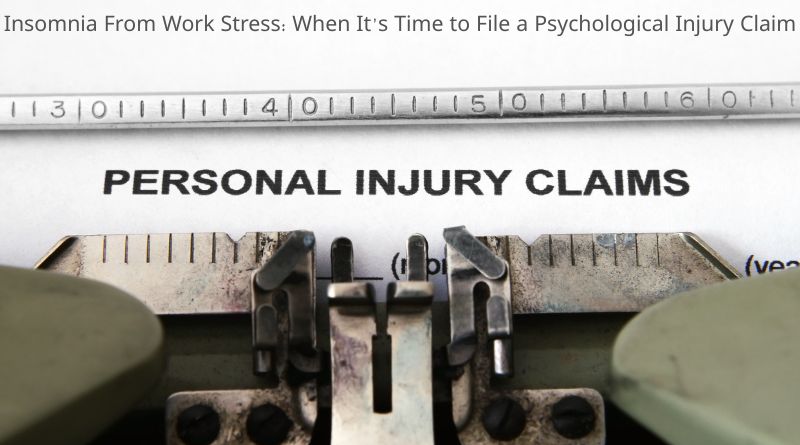Struggling to sleep at night because of overwhelming work stress is more than just an inconvenience. It can affect your health, productivity, and quality of life. This article explains how insomnia caused by workplace pressure can rise to the level of a psychological injury, when you may have grounds to file a workers’ compensation claim, and why working with experienced workers’ compensation lawyers, such as those at www.workerscompensationattorneyorangecounty.com, can make the process much easier.
How Work Stress Impacts Sleep
When you’re under constant pressure at work, your mind doesn’t easily shut off. Late-night emails, tight deadlines, and even toxic work environments can keep your brain on overdrive long after you’ve left the office. This mental overload leads to sleepless nights, which in turn can cause mood swings, poor concentration, and even physical illness.
Fun fact: Scientists estimate that humans spend about one-third of their lives asleep, yet work-related stress is one of the leading reasons people lie awake staring at the ceiling.
The Connection Between Stress and Psychological Injuries
Sleep issues are only the beginning. Chronic insomnia from workplace stress can spiral into anxiety, depression, or even burnout. In legal terms, these conditions may be considered “psychological injuries.” Unlike physical injuries, they aren’t always visible, which makes them harder to prove, but that doesn’t mean they aren’t real or valid.
This is why many people seek legal guidance. Workers’ compensation lawyers understand how to connect the dots between your workplace conditions, your insomnia, and the resulting psychological harm.
When Can You File a Psychological Injury Claim
Before filing a claim, it’s important to know the situations where insomnia and stress-related conditions might qualify. While laws vary by state, some common scenarios include:
- Excessive Workload: If your employer consistently demands unrealistic hours and deadlines.
- Hostile Environment: If bullying, harassment, or poor management practices create unbearable stress.
- Traumatic Events: For employees exposed to shocking or emotionally disturbing incidents at work.
In many cases, you’ll need medical documentation showing how stress has affected your mental health. This is where legal assistance becomes crucial.
The Role of Workers’ Compensation Lawyers
Trying to file a claim on your own can be daunting. Insurance companies often dispute psychological injuries, arguing that insomnia is “just stress” rather than a work-related harm. Skilled workers’ compensation lawyers know how to counter these arguments with medical evidence, workplace records, and expert testimony. For anyone looking to reach out right away, an interactive map link can make it easier to find the right support:
They not only improve your chances of approval but also make sure you receive benefits like medical treatment coverage, wage replacement, or even vocational rehabilitation if needed. Having a lawyer by your side can also relieve some of the stress that triggered your insomnia in the first place.
What to Expect During the Process
Once you file, here’s what typically happens:
- Medical Evaluation: A doctor will assess your insomnia and related conditions.
- Claim Review: The insurance company will analyze your case, often looking for reasons to deny.
- Appeals if Denied: If your claim is rejected, your lawyer can guide you through appeals or hearings.
Each step can feel overwhelming, but professional legal support ensures you’re not fighting the battle alone.
Managing Stress While Your Claim Is Pending
Filing a claim is one step toward justice, but caring for yourself during the process is just as important. Consider practices like mindfulness, regular exercise, or talking with a therapist. Even small lifestyle changes, like setting boundaries with work emails at night, can improve your sleep.
Fun fact: The record for the longest period without sleep is 11 days, set by Randy Gardner in 1964. While he survived, his concentration and mood deteriorated quickly, showing how essential rest really is.
Insomnia from work stress should not be brushed aside as “just part of the job.” If sleepless nights are tied to toxic workplace conditions, you may have grounds for a psychological injury claim. Workers’ compensation lawyers can be your strongest allies, helping you prove your case and access the support you need.
Your health and peace of mind matter as much as your paycheck. By taking action, you not only protect your rights but also send a clear message that mental health is just as important as physical safety in the workplace.

